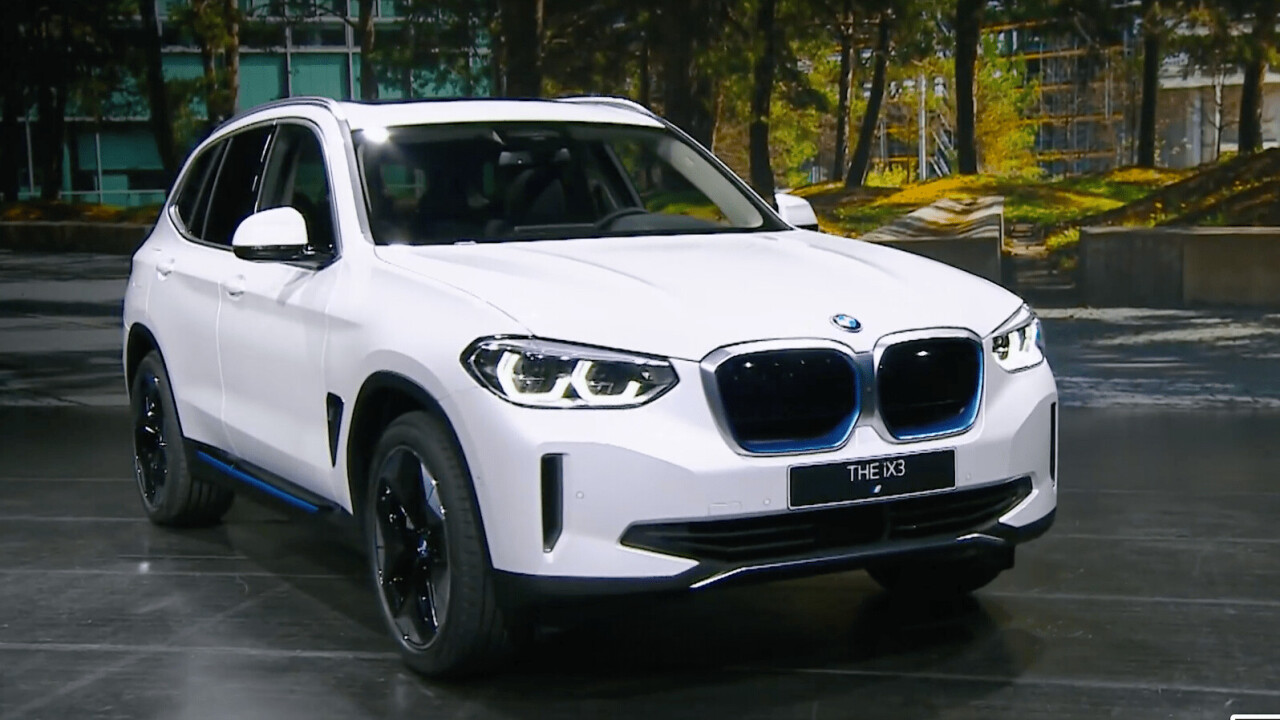
One of the most hotly anticipated electric vehicles from the German automaker BMW is finally here, officially: say hello to the iX3.
BMW isn’t shifting to all-electric drivetrains in one fell swoop, the iX3 is built on a platform that shares a lot of components with its combustion engined brothers and sisters. As a result the iX3 looks a lot like its petrol and diesel counterparts.
But there are a few subtle styling cues that help tell the world that it’s an electric breed of the popular sports activity vehicle.
[Read: The upcoming Fisker Ocean EV might end up being a VW underneath]
Despite numerous leaks earlier this year, let’s take a closer look at the official thing.

Let’s start at the front with that “kidney grille.”
BMW was never going to get rid of its iconic style element for the electric car, but it has filled it in for optimized aerodynamics. It’s also likely a good place to put sensors for driver aids like automated cruise control.
We can also see a small camera between the two kidneys, this will no doubt be used as part of the vehicle’s 360 degree surround view system.

Another iconic styling cue for BMW are its headlights. All BMWs feature what it calls “halo” lights. Where the main component of the light is its outer edge; when headlights or daytime running lights are switched on, they illuminate like a halo.
They’re still present on the iX3 but have taken on a much more angular hexagonal shape compared to the classic circle halos of old.

The BMW iX3 also features a collection of subtle hints to the car’s heritage that comes from the original BMW i range of all-electric vehicles. Along the front quarter, there is BMW i branding behind the wheel arch.

Further along the side of the vehicle, BMW carries on its blue theme — which was the original brand color of the BMW i range. Here we see the side runners of the vehicle get a blue flash, again to let any distant onlookers know that this is an electric vehicle.

At the rear of the vehicle, it’s business as usual. Besides the blue surround on the BMW roundel and the model designation badge, there isn’t a lot to hint that this is electric. Obviously, the lack of tailpipes will do that, but the car has an overall familiar design — which for a lot of BMW drivers is probably a good thing.

The approach is classic BMW; conservative with a hint of aggression. It’s kind of dull, because it’s exactly what we’ expect, but that’s also a good thing — let me explain.
Over the years, electric cars, BMW’s i range included, were radical imaginations of the future which had unique designs, unconventional body shaping, sparse cockpits, and were quite a departure from what most of us are used to.

To shift to cleaner transport, first we need to get all-electric drivetrains and charging infrastructure sorted, then we should start pushing the boundaries of design.

In doing so, electric cars can become a more appealing proposition to far more people. In the short term, choosing electric power will be a purchase decision like choosing between diesel or petrol — which makes it seem like a much smaller jump than having to buy into a whole new range of vehicles.
In the long term, this electric variant of a standard BMW model is a sign that the company is commited to making the transition to greener drivetrains and that the industry, too, is finally moving in the right direction.
Get the TNW newsletter
Get the most important tech news in your inbox each week.




